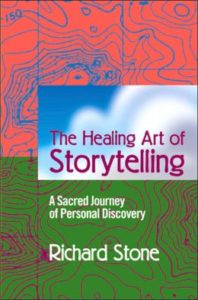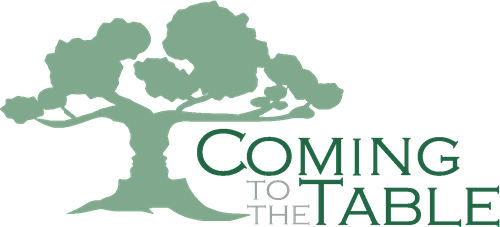The Healing Power of Storytelling
by Sha Jackson
From the time we exit the womb until the time we enter the sands we begin to construct our personal narrative. In between these two points a multitude of stories are created, some are significant enough for us to remember and tell over and over again and others are just small remnants of our day to day lives.
Whether it is the baby who cries, telling the story of his hunger, the teenager who rebels, telling the stories of their discontent, or the wife who rushes home to tell the details of her day, the stories of our lives reveal the platform of our identities.
There are multiple levels of storytelling—the story of the individual, the story of the family, the story of the community and the story of the nation. Healing as defined as, curing the wounds, particularly those associated with slavery and its legacies, can also be achieved on these levels.
Richard Stone, the author of The Healing Art of Storytelling, says “without stories, life becomes a book cover without the pages—nice to look at, but not very fulfilling”.
The meaning of this story on storytelling is to give some thought to telling the whole and complete stories of our lives, communities and nation.
In America there is a dominant narrative that succeeds in masking the true or complete narrative. America’s story is one of kidnapping, triumph, injustice, economic exploitation, and bitter hatred, but the story that we privilege is one of triumph, victory, necessity. It is a story that masks the whole truth. It is a story that lists one group of people as the victims and the other as the offender. It is a story that has seeped into the cultural narratives of each group and is caused divide. This story has been perpetuated during the course of American history and a new chapter needs to be written, which tells the story in a way that does not privilege one truth over the other. This title should undoubtedly be named healing, because that is what will inevitably come from the writing of it. Everyone has a responsibility to add to this story.
Vanessa Jackson, President of Healing Circles, says that storytelling is not reserved for a particular group of people.
“Everyone is a storyteller; even people who don’t have the ability to use words are storytellers. The question is how do we become more intentional in our storytelling.”
For our nation this is really an important concept—being deliberate in fervently addressing the way we tell the story of our nation unmasking the “unspoken truths” that haunt us from generation to generation.
The question then is raised, how do we as parts of the whole that is America, take part in telling the complete story that will lead to our healing as a nation. What does a healing form of storytelling look like for the individual?
Jackson provides some insight that might help us address this question.
“In order for [America] to open [itself] up to the possibility of a new story [that involves true healing and moving beyond the legacies of enslavement] we have to stop performing the same story that we have become comfortable with. We have to tell our stories in a way that keeps us constantly open to different pieces and dynamics of it.”
Jackson’s words show that there has to be some room for change and evolution in our story that reflects how we are constantly changing and evolving in our way of thinking. She states that the balance we have between telling our stories and being open for that story to change is fragile.
“It’s like when you come home from the store and your hands are full of bags and you are in a balancing act. You are focused on opening the door and then someone offers to help you. You just want to get to a place where we can put it down you don’t want to engage help with the fear of it falling apart.”
America is now in that balancing act trying to figure out how we have physically moved beyond slavery, but mentally and structurally we are still there because our stories separate us based on race. People are reaching out to help America by sharing their interest in having a serious conversation about slavery’s legacy that will lead to healing, but with the fear of things “falling apart” America has not completely accepted that offer. Jackson states that if storytelling became a viable option for America then true healing would take place.
“If storytelling is infiltrated in our society it will help us tell the ultimate truth about the trauma and [hatred] that is [in] the blood of America. It will help us tell the story that shame, guilt, and fear has prevented us from telling. There is an African proverb that states you ‘you cannot heal what you conceal’. We need to begin telling the true story about the fundamental American wound”.
Jackson says that if people are willing to begin telling their stories together and have them represented, that the story of America will take on a more honest shape. She spoke of the need for storytellers to “invite people into their stories” as a means to help develop the story; America needs to invite its inhabitants into its story so the grossly misrepresented American story, which exists in most history books, can be corrected to include the truth about the founding of our beloved America.
The more people share their stories, the more there is a chance for the frame of their story to be widened, Jackson says. If people invite possibility into their stories, they are able to pan their stories and take in other truths that may exist beyond the borders of their story.
 “Slavery is a good example [of people needing to pan back] I, like others, could tell the story of my family being brutalized, but if I don’t widen the lens I can’s see that my existence today is a miracle. If I focus on the story of the history and not the story of what came out of it, which is a story of survival, triumph, and love, then I could miss out on the healing.
“Slavery is a good example [of people needing to pan back] I, like others, could tell the story of my family being brutalized, but if I don’t widen the lens I can’s see that my existence today is a miracle. If I focus on the story of the history and not the story of what came out of it, which is a story of survival, triumph, and love, then I could miss out on the healing.
In The Healing Art of Storytelling Richard Stone identifies the term “destorification.” He describes this has the growing absence of the need for story in our society. He and Jackson both agree that a large part of “destorification” comes from the growing presence of technology in our society that separates people from the need to interact with others through the telling of stories.
“The spaces for us to tell our stories are disappearing, Jackson says. People have to stop and find time to tell their stories and we need to create more opportunities for storytelling in our families, communities and nation. Whether it’s the stories we tell a higher being or the stories we tell our family members.”
Jackson communicates that the re-introduction of storytelling in our society will help us better connect to one another and address deep underlying issues that prevent us from fully healing from events such as the legacy of enslavement.

